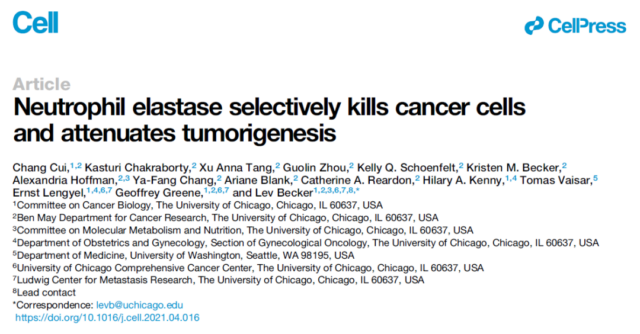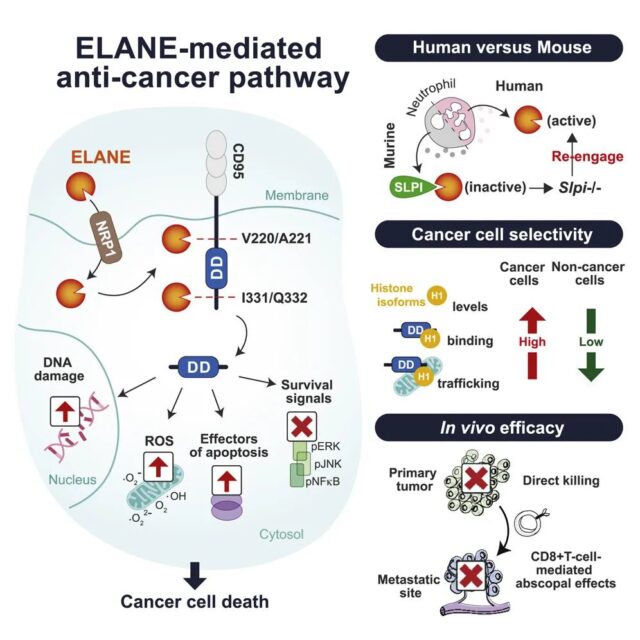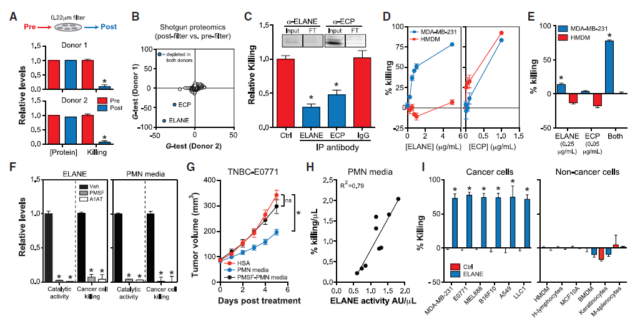The protease of neutrophils kills cancer cells without harming normal cells
- Normal Liver Cells Found to Promote Cancer Metastasis to the Liver
- Nearly 80% Complete Remission: Breakthrough in ADC Anti-Tumor Treatment
- Vaccination Against Common Diseases May Prevent Dementia!
- New Alzheimer’s Disease (AD) Diagnosis and Staging Criteria
- Breakthrough in Alzheimer’s Disease: New Nasal Spray Halts Cognitive Decline by Targeting Toxic Protein
- Can the Tap Water at the Paris Olympics be Drunk Directly?
Cell blockbuster: Broad-spectrum anti-cancer therapy may be born, this protease of neutrophils can kill
The protease of neutrophils kills cancer cells without harming normal cells. This study reveals the fundamental difference between human and mouse neutrophils in activating this elastase ELANE-mediated anti-cancer pathway, which is of great significance for the transformation of anti-cancer mechanisms in mice to humans.
Cancer is a genetic mutation disease that exhibits a high degree of genetic heterogeneity. In addition to overcoming this heterogeneity, eradicating cancer cells while retaining non-cancerous cells is still a difficult task. Therefore, it has always been a challenge to develop pan-cancer drugs that can combine multiple cancer types.
Our innate immune system can resist a variety of infectious pathogens, and the genetic variation of these pathogens far exceeds that of cancer. As a key effector of innate immunity, neutrophils can eliminate genetically heterogeneous pathogens. When infection or inflammation occurs in the human body, neutrophils will gather in the inflammation place and begin to phagocytose cells and bacteria, helping the body to resist infection Wait for the occurrence of diseases. And it has a similar function in cancer. However, the mechanism by which neutrophils kill cancer cells is not fully understood.
Compared with the anti-cancer function of neutrophils, many studies have shown that neutrophils can also promote the occurrence of tumors. This conflict may be caused by species differences in the function of neutrophils and/or their tissue sources and activation states.
Recently, a research team from the University of Chicago published a research paper titled: Neutrophil elastase selectively kills cancer cells and attenuates tumorigenesis in the top international academic journal Cell.
The research team found that neutrophil elastase ELANE can kill cancer cells with different genetic diversity and has minimal toxicity to non-cancer cells, which increases the possibility of developing it as a pan-anti-cancer therapy.


First, the research team treated a variety of different human or murine cancer cells/tissues with human neutrophil medium, and found that the cancer cells were all killed, in contrast, non-cancer cells were not affected. It is proved that the neutrophil culture medium contains factors that selectively kill cancer cells in vitro and in vivo.
In order to determine whether this anti-cancer function is a general characteristic of neutrophils, the research team purified human and murine neutrophils from a variety of sources, and found that the factors released by human neutrophils can selectively kill multiple neutrophils. Kind of cancer cells, but murine neutrophils lack this characteristic.

In order to identify anticancer factors in human neutrophil culture medium, the research team developed a quantitative killing assay to track biologically active factors, and proteomics targeted neutrophil elastase (ELANE).
Next, the research team immunized and removed ELANE in the neutrophil culture medium and found that ELANE killed cancer cells in a dose-dependent manner without affecting normal cells, indicating that ELANE is an important anti-cancer protein in the neutrophil culture medium .

After determining that ELANE is an important anti-cancer protein released by human neutrophils, the research team explored whether the differences in ELANE biology between human and murine neutrophils could explain their killing power against cancer cells.
The research team found that mouse neutrophils release an inhibitor that inhibits the activity of ELANE. Knockout of the inhibitor gene can restore ELANE activity and its related anti-cancer function. These results reveal the fundamental difference between human and mouse neutrophils in activating this ELANE-mediated anticancer pathway.

Previous studies have shown that porcine pancreatic elastase (PPE) is an ELANE homolog with approximately 32% amino acid identity. Experiments have confirmed that, similar to ELANE, PPE selectively kills cancer cells, does not induce normal cell apoptosis, and does not affect body weight, spleen weight or liver function, showing the effect of improving disease.

Overall, the study revealed the fundamental difference between human and mouse neutrophils in activating this elastase ELANE-mediated anti-cancer pathway, which is useful for transforming the anti-cancer mechanism in mice to humans. It is of great significance. ELANE/PPE can kill genetically heterogeneous cancer cells while preserving host cells. By maximizing the therapeutic effect of ELANE/PPE, it can be used as a single anti-cancer therapy or a combined anti-cancer therapy.
(source:internet, reference only)
Disclaimer of medicaltrend.org



